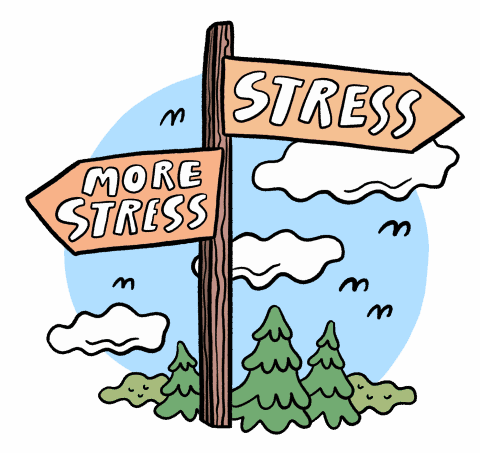 Another year, another season of how-to articles on healthy coping mechanisms. It’s just as inevitable as the shame you probably feel while reading them. Honestly, who actually gets nine hours of sleep per night, journals regularly, quits caffeine and reaches enlightenment through meditation while they’re in school?
Another year, another season of how-to articles on healthy coping mechanisms. It’s just as inevitable as the shame you probably feel while reading them. Honestly, who actually gets nine hours of sleep per night, journals regularly, quits caffeine and reaches enlightenment through meditation while they’re in school?
The reason you’ve probably avoided adopting healthy practices is because you think they are unattainable. Rather than fail at being healthy, you embrace the polar opposite — starving yourself by day, binge drinking by night and all of the other flattering college-student stereotypes you can think of —but there really is a better way.
It begins with you accepting the fact that you’re not going to be perfect at being healthy — instead, you can work on being satisfied with doing what you can when the stress hits. Focus on positive activities: hopping on your bike, breaking a sweat at the gym, strumming some angsty music on your guitar, painting, drawing, writing or whatever you genuinely enjoy doing outside of school and work.
I think we can all agree that time management is a difficult but necessary part of being an adult. What you may not have considered is that managing your time and getting stuff done is a lot easier when you balance it all out with things you enjoy that don’t make your brain hurt.
When you accept the fact that you’re a holistic person who can’t be only a student 24-7, you’ll naturally shift from actively trying to cope with stress to being able to effectively deal with it.
You’ll see that going out for casual drinks with your friends once or twice a week can be a healthy way to take a break from studying instead of binge drinking on the weekends. You’ll realize that taking time to do fun things daily is okay — in fact, it’s good — because you are a multi-faceted person not just a student.
My own past unhealthy coping mechanisms often included a self-induced shutting out of every aspect of my being beyond academics. When I felt anxious and out of control, I clung to the one thing I knew I could succeed at but ended up failing miserably at friendships, relationships, my job and being a decent person in general.
In this case, coping healthily meant not obsessing over my grades or that assignment due a month from now — it meant allowing myself to meet people, hang out with friends, pursue new interests and gain confidence in multiple areas of my life.
So, at the end of the day, health isn’t all-or-nothing — or even about sacrificing everything to be a good student — it’s a matter of balancing the demands of school with the things that make life worth living.
Once you begin to find a balance between academic pursuits and otherwise, you’ll see that you don’t have to be a zen master to make healthy choices and that just because you don’t measure up to an impossible standard doesn’t mean that you’ve fallen off the deep end.
The argument is simple: choosing healthy outlets for stress is infinitely better than embracing self-destruction, once you begin to define healthy as a self-identified balance rather than a top-ten list of impossible feats of perfection.
—
Megan Fairbairn
Graphic: Jaymie Stachyruk / Graphics Editor
Leave a Reply